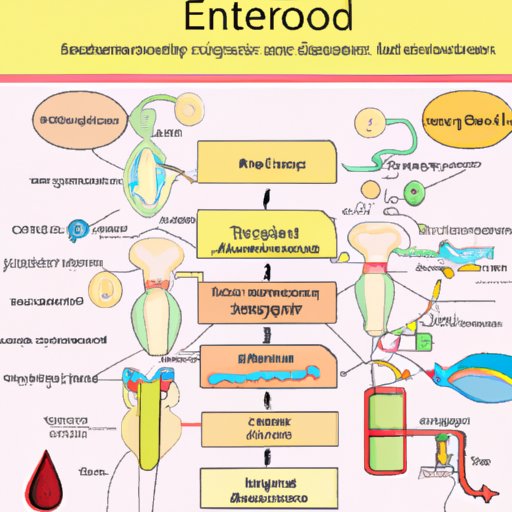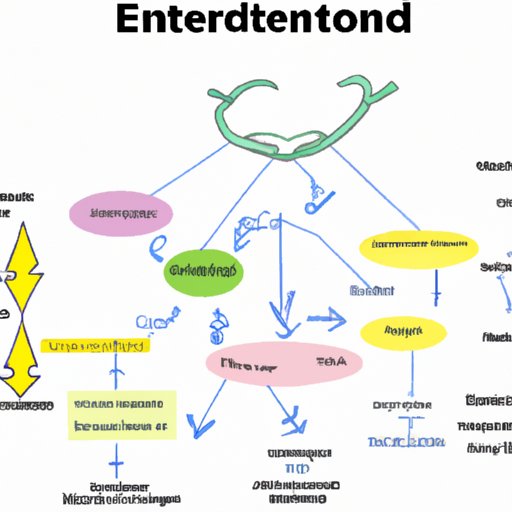Overview of the Endocrine System
The endocrine system is a complex network of glands and hormones that plays a crucial role in regulating many of the body’s most important functions. These include metabolism, growth, development, behavior, reproduction, and energy balance. The endocrine system works in tandem with the nervous system to control and maintain homeostasis throughout the body.
The endocrine system is made up of several organs, including the hypothalamus, pituitary gland, thyroid, parathyroid, adrenal glands, and pancreas. Each of these organs produces and secretes hormones that help regulate different body processes. In addition, some endocrine glands are located in other organs, such as the ovaries and testes.
Hormones are chemical messengers that travel through the bloodstream and communicate with cells throughout the body. Different hormones have different functions, and they can be grouped into two categories: steroid hormones and peptide hormones. Steroid hormones, like testosterone, estrogen, and cortisol, are lipid-soluble molecules that can pass through cell membranes. Peptide hormones, such as insulin and growth hormone, are water-soluble proteins that bind to receptors on the surface of cells.

Anatomy and Physiology of the Endocrine System
Endocrine glands are composed of specialized cells known as secretory cells. These cells produce hormones and store them in small sacs called vesicles. When these hormones are needed, the secretory cells release them into the bloodstream. From there, the hormones circulate throughout the body until they reach their target cells, where they bind to specific receptors and cause a response.
The endocrine system is made up of several different organs, each of which has its own unique structure and function. The hypothalamus, for example, is a small region of the brain responsible for controlling hunger, thirst, temperature, and sleep. This organ also produces hormones that regulate the production and secretion of other hormones from the pituitary gland.
The pituitary gland is the “master gland” of the endocrine system and is responsible for producing and releasing several different hormones. These hormones regulate growth, sexual development, and metabolism, among other functions. The thyroid gland is located at the base of the neck and produces hormones that help regulate metabolism, body temperature, and heartbeat.
The parathyroid glands are found near the thyroid and produce parathyroid hormone, which helps regulate calcium levels in the blood. The adrenal glands, located just above the kidneys, produce hormones such as adrenaline and cortisol, which help the body respond to stress. Lastly, the pancreas produces insulin and glucagon, hormones that regulate sugar levels in the blood.

Functions of the Endocrine System
The endocrine system plays a vital role in maintaining homeostasis in the body. It regulates many of the body’s most important processes, such as metabolism, growth, and reproduction. Hormones produced by the endocrine system also play a role in controlling mood and behavior, as well as energy balance and body temperature.
The endocrine system works in conjunction with the nervous system to regulate bodily functions. The nervous system uses electrical signals to quickly transmit messages to the body, while the endocrine system uses hormones to slowly, but more deeply, influence the body’s processes. As a result, the endocrine system is better able to regulate long-term changes in the body.

Role of Hormones in the Endocrine System
Hormones are the key players in the endocrine system, and each hormone has a specific role. For instance, insulin is a hormone produced by the pancreas that helps regulate the body’s blood sugar levels. Testosterone, a steroid hormone produced by the testes, is responsible for male sexual development and secondary sex characteristics. Estrogen, another steroid hormone, is produced by the ovaries and plays an important role in female reproductive health.
Other hormones, such as growth hormone and cortisol, help regulate metabolism, growth, and stress response. Thyroid hormones, produced by the thyroid gland, help regulate body temperature and metabolic rate. Finally, prolactin, a peptide hormone produced by the pituitary gland, aids in lactation and the production of breast milk.
Disorders and Diseases of the Endocrine System
Just like any other part of the body, the endocrine system can be affected by disease and disorders. Some common endocrine disorders include diabetes, hypothyroidism, hyperthyroidism, and Addison’s disease. These disorders can cause a variety of symptoms, depending on the type of disorder.
Diabetes, for example, is caused by a deficiency or absence of insulin. Symptoms of diabetes include increased thirst and urination, fatigue, weight loss, blurred vision, and slow healing of cuts and bruises. Hypothyroidism is caused by an underactive thyroid gland and can lead to symptoms such as fatigue, weight gain, dry skin, and constipation. Hyperthyroidism, on the other hand, is caused by an overactive thyroid gland and can lead to symptoms such as rapid heart rate, anxiety, weight loss, and bulging eyes.
Diagnosis and Treatment of Endocrine System Disorders
If you are experiencing any of the symptoms mentioned above, it is important to see your doctor. Your doctor will ask questions about your medical history and perform a physical exam. They may also order laboratory tests, such as blood tests and imaging scans, to diagnose the condition.
Treatment for endocrine disorders depends on the type and severity of the condition. Common treatments include medications, lifestyle changes, and surgery. Medications may be prescribed to treat the underlying condition, while lifestyle changes, such as diet and exercise, may be recommended to help manage symptoms. Surgery may be necessary to remove tumors or damaged tissues.

Tips for Maintaining Healthy Endocrine System Function
In order to keep your endocrine system functioning optimally, it is important to make healthy lifestyle choices. Eating a balanced diet rich in fruits, vegetables, whole grains, and lean proteins can help support endocrine health. Getting regular exercise and managing stress can also help keep the endocrine system running smoothly.
It is also important to avoid smoking and excessive alcohol consumption, as these can both have a negative effect on endocrine health. Finally, getting regular check-ups with your doctor and being aware of the signs and symptoms of endocrine disorders can help ensure early diagnosis and treatment.
(Note: Is this article not meeting your expectations? Do you have knowledge or insights to share? Unlock new opportunities and expand your reach by joining our authors team. Click Registration to join us and share your expertise with our readers.)
